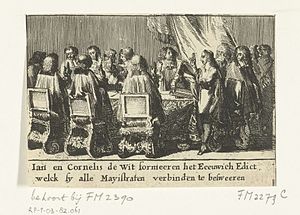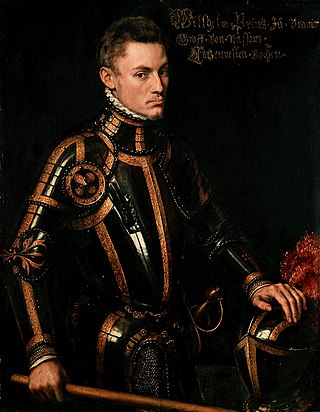
In the Low Countries, a stadtholder was a steward, first appointed as a medieval official and ultimately functioning as a national leader. The stadtholder was the replacement of the duke or count of a province during the Burgundian and Habsburg period.

William II was sovereign Prince of Orange and Stadtholder of Holland, Zeeland, Utrecht, Guelders, Overijssel and Groningen in the United Provinces of the Netherlands from 14 March 1647 until his death three years later. His only child, William III, reigned as King of England, Ireland, and Scotland.
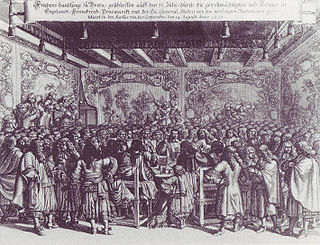
The Peace of Breda, or Treaty of Breda was signed in the Dutch city of Breda, on 31 July 1667. It consisted of three separate treaties between England and each of its opponents in the Second Anglo-Dutch War: the Dutch Republic, France, and Denmark–Norway. It also included a separate Anglo-Dutch commercial agreement.

Johan de Witt, lord of Zuid- en Noord-Linschoten, Snelrewaard, Hekendorp en IJsselvere, was a Dutch statesman and a major political figure in the Dutch Republic in the mid-17th century, the First Stadtholderless Period, when its flourishing sea trade in a period of global colonisation made the republic a leading European trading and seafaring power – now commonly referred to as the Dutch Golden Age. De Witt was elected Grand pensionary of Holland, and together with his uncle Cornelis de Graeff, he controlled the Dutch political system from around 1650 until the Rampjaar of 1672. This progressive cooperation between the two statesmen, and the consequent support of Amsterdam under the rule of De Graeff, was an important political axis that organized the political system within the republic.

Gaspar Fagel was a Dutch politician, jurist, and diplomat who authored correspondence from and on behalf of William III, Prince of Orange, during the English Revolution of 1688.

The Act of Seclusion was an Act of the States of Holland, required by a secret annex in the Treaty of Westminster (1654) between the United Provinces and the Commonwealth of England in which William III, Prince of Orange, was excluded from the office of Stadtholder. Seclusion is defined as the state of being private and away from other people. The First Stadtholderless Period had been heralded in January 1651 by States Party Regenten, among whom the republican-minded brothers Cornelis and Andries de Graeff and their cousins Andries and Cornelis Bicker, during the Grote Vergadering in The Hague, a meeting of representatives of the States of each of the United Provinces. This meeting was convened after the death of stadtholder William II on November 6, 1650, when the States of Holland decided to leave the office of Stadtholder vacant in their province.

Gillis Valckenier (1623–1680) was nine years burgomaster of Amsterdam: in 1665, 1666, 1668, 1670, 1673, 1674, 1676, 1678, 1679. He had a strong personality, but changed allies as a real opportunist.
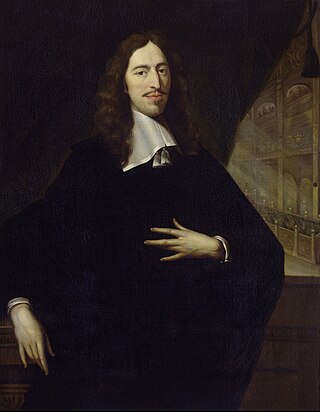
The First Stadtholderless Period or Era is the period in the history of the Dutch Republic in which the office of Stadtholder was vacant in five of the seven Dutch provinces. It coincided with the zenith of the Golden Age of the Republic.

Johan Kievit (1627–1692) was an Orangist Rotterdam Regent, who may have been one of the instigators of the murder of former Grand Pensionary Johan de Witt, of the Dutch Republic, and his brother Cornelis de Witt on 20 August 1672, together with his brother-in-law, Cornelis Tromp.
Johan van Banchem was one of the leaders of the lynching of Johan de Witt and Cornelis de Witt on August 20, 1672. He was rewarded for this crime with an appointment as baljuw of The Hague by Stadtholder William III. After a few years in this function he was arrested and convicted for gross abuse of his office. He was sentenced to death on November 26, 1680 by the Hof van Holland, but appealed the verdict to the Hoge Raad van Holland en Zeeland. He died in jail before this appeal was finished.

Henri de Fleury de Coulan, Sieur de Buat, St Sire et La Forest de Gay was a captain of horse in the army of the Dutch Republic, who became embroiled in a celebrated conspiracy during the First Stadtholderless Period to overthrow the regime of Grand Pensionary Johan de Witt in favor of future Stadtholder William III, known as the Buat Conspiracy. He was convicted of treason in 1666 and executed.
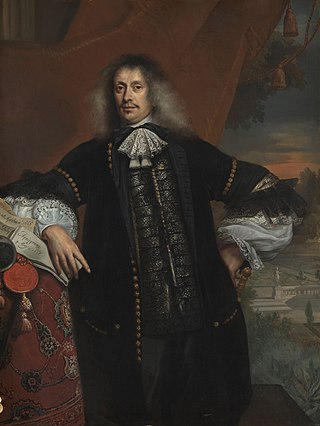
Hieronymus van Beverningh was a prominent Dutch regent, diplomat, amateur botanist, and patron of the arts, who lived during the Dutch Golden Age.

William Frederick, Count of Nassau-Dietz, Stadtholder of Friesland, Groningen and Drenthe.
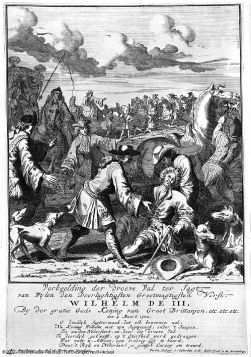
The Second Stadtholderless Period or Era is the designation in Dutch historiography of the period between the death of stadtholder William III on March 19, 1702, and the appointment of William IV as stadtholder and captain general in all provinces of the Dutch Republic on May 2, 1747. During this period the office of stadtholder was left vacant in the provinces of Holland, Zeeland, and Utrecht, though in other provinces that office was filled by members of the House of Nassau-Dietz during various periods. During the period the Republic lost its status as a great power and its primacy in world trade. Though its economy declined considerably, causing deindustralization and deurbanization in the maritime provinces, a rentier-class kept accumulating a large capital fund that formed the basis for the leading position the Republic achieved in the international capital market. A military crisis at the end of the period caused the fall of the States-Party regime and the restoration of the Stadtholderate in all provinces. However, though the new stadtholder acquired near-dictatorial powers, this did not improve the situation.
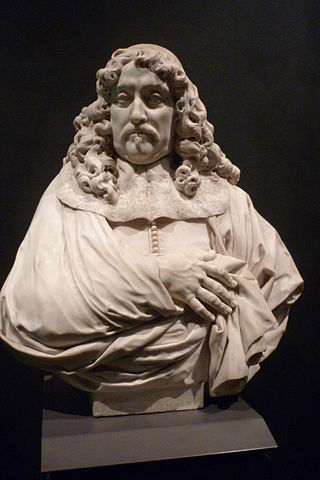
Andries de Graeff was a regent and burgomaster (mayor) of Amsterdam and leading Dutch statesman during the Golden Age.

In the history of the Dutch Republic, Orangism or prinsgezindheid was a political force opposing the Staatsgezinde (pro-Republic) party. Orangists supported the Princes of Orange as Stadtholders and military commanders of the Republic, as a check on the power of the regenten. The Orangist party drew its adherents largely from traditionalists – mostly farmers, soldiers, noblemen and orthodox Protestant preachers, though its support fluctuated heavily over the course of the Republic's history and there were never clear-cut socioeconomic divisions.

The Dutch Republic existed from 1579 to 1795 and was a confederation of seven provinces, which had their own governments and were very independent, and a number of so-called Generality Lands. These latter were governed directly by the States-General, the federal government. The States-General were seated in The Hague and consisted of representatives of each of the seven provinces.
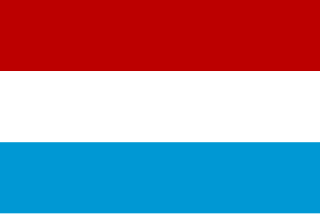
The Dutch States Party was a political faction of the United Provinces of the Netherlands. This republican faction is usually (negatively) defined as the opponents of the Orangist, or Prinsgezinde faction, who supported the monarchical aspirations of the stadtholders, who were usually members of the House of Orange-Nassau. The two factions existed during the entire history of the Republic since the Twelve Years' Truce, be it that the role of "usual opposition party" of the States party was taken over by the Patriots after the Orangist revolution of 1747. The States party was in the ascendancy during the First Stadtholderless Period and the Second Stadtholderless Period.

The Loevestein faction or the Loevesteiners were a Dutch States Party in the second half of the 17th century in the County of Holland, the dominant province of the Dutch Republic. It claimed to be the party of "true freedom" against the stadtholderate of the House of Orange-Nassau, and sought to establish a purely republican form of government in the Northern Netherlands.
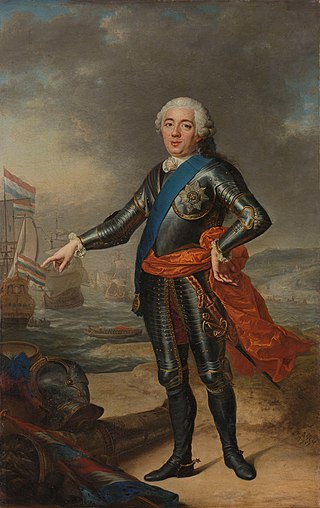
The Orangist revolution of 1747 brought William IV, Prince of Orange to the Stadtholder office, finishing the Second Stadtholderless Period.
